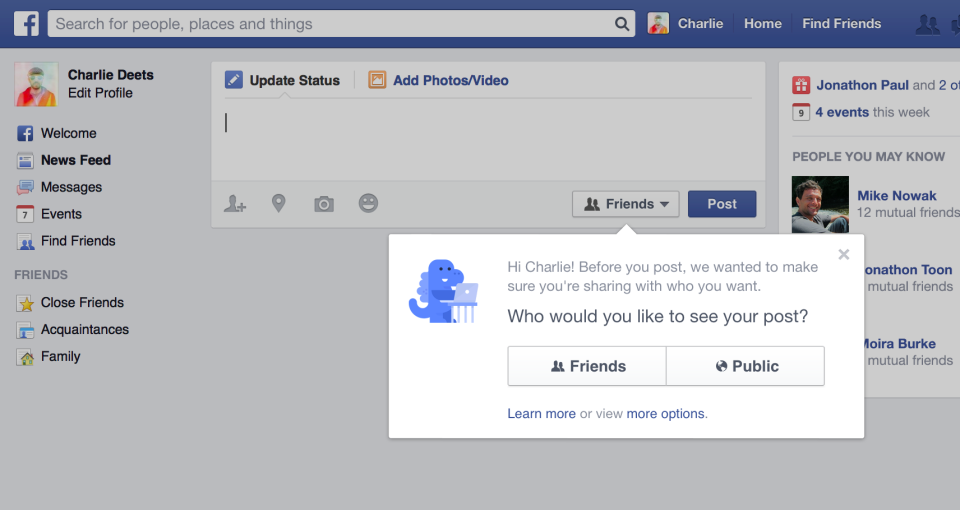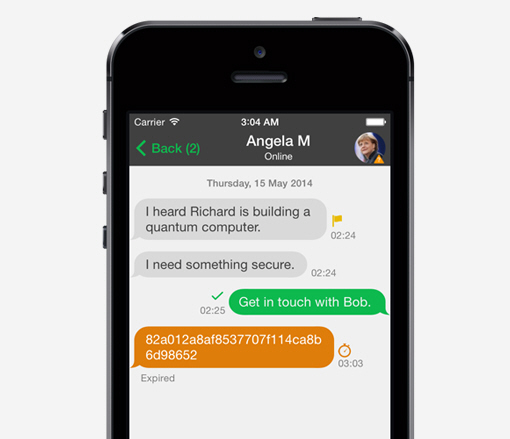
The most popular stories on BetaNews this past week: May 18 -- May 24
It should come as no surprise that this week's big news was Microsoft's Surface Pro 3 unveiling. Brian had been looking forward to the NYC event and was at the event to get hands on with the new device. There's certainly a lot to love about Microsoft's third generation tablet, but there is that price to consider. If you like the look of what you see, the device is available for pre-order right now -- and if you're undecided between the Surface and a MacBook Air, Mihaita compared the two. Maybe you're one of those who thinks it’s a niche product.
The Surface Mini failed to make an appearance, but there are still lots of other tablets to choose from -- although they are yet to make much of an impression in higher education, unlike Chromebooks which have found their way into Welsh schools. Will Microsoft's tablet manage to attain the longevity of Apple's iPad? You'd be forgiven for thinking that hell itself had frozen over at the news that work is underway that will make it possible to run Android and iOS apps side by side on the same device.

Facebook listens to feedback and tightens up privacy settings -- a bit
Privacy. It's something that we're all concerned about, particularly online. Facebook is one of many companies that comes in for scrutiny and criticism for the way it handles user privacy, and there have long been complaints about the fact that statuses and uploaded photos are made publicly accessible by default. Today that changes. After years of pestering, Facebook has listened to its user base and changed the default visibility setting to "Friends only". At least this is the case for brand new users.
Anyone signing up for a new Facebook account -- can there be many people left who do not yet have one? -- will be able to avoid accidentally sharing private photos with the world. "Going forward, when new people join Facebook, the default audience of their first post will be set to Friends. Previously, for most people, it was set to Public," says Facebook in a blog post. The first time a post is made, users will be asked whether it should be made public or limited to a smaller audience. If no selection is made, it will default to Friends.

Warning to Android users -- Outlook.com app stores emails unencrypted
Reverse engineering apps is an interesting field of work. On one hand, it can be used by software engineers to determine how an app works so they can copy it. On the other, the method can be used by those with malicious intent to track down weaknesses that can then be exploited. But there's also a third hand. Reverse engineering can also be used to highlight security problems with a view to not only alerting those affected, but also addressing the problem.
Researchers at Include Security, whilst practicing their reverse engineering skills, turned their attention to the Outlook.com app for Android and discovered a potentially worrisome security issue.

PQChat secures your communications using quantum computing-proof encryption
After Edward Snowden’s many (and on-going) revelations, it’s easy to think there’s not much you can really do to avoid being spied upon or prevent your communications potentially being monitored. Of course you probably don’t have much to hide, and therefore what you say isn’t likely to be of major interest to the NSA or other snoopers, but that doesn’t mean you shouldn’t at least try to maintain a degree of privacy where possible.
SRD Wireless has today announced the launch of PQChat, a free app for iOS based on SRD’s own Never-The-Same (NTS) encryption which protects data using the McEliece cryptosystem, the strongest currently known, and which has never been broken (as far as anyone is aware, at least).

Protect your privacy with Self-Destructing Cookies for Firefox
Self-Destructing Cookies is a Firefox add-on which does a great job of controlling cookie use, without any of the complexity you’ll see in other tools.
Install the add-on and it takes immediate effect, automatically deleting a site’s regular cookies -- and its LocalStorage data -- just as soon as you close its tab.

Google, somehow, gains 100% rating for protecting user data
It may seem as though Google feels the sharp end of many tongues -- be it about problems with Glass, for shaping the content of the internet, or the way it handles advertising. But more often than not, the big G finds itself on the receiving end of criticism for being in bed with the NSA for the way it handles user privacy. In spite of all of the ammunition unleashed in Google's direction, the company has -- incredibly -- been awarded a full six stars out of six by the Electronic Frontier Foundation for protecting user data from government requests.
The EFF's Who Has Your Back? report ranks and rates the performance of some of the biggest names in the world of tech for handling user privacy in the face of government data requests. Finding ourselves in a world now tainted by the activities of the NSA, privacy and accountability have become more important to internet users than ever before. The Electronic Frontier Foundation prides itself on "defending your rights in the digital world", and its annual report looks at the performance and promises of 26 companies who handle your data.

Google preparing an online tool for 'right to be forgotten' removal requests
Google is reportedly readying an online tool which people will be able to use to request that search results pertaining to them are removed from Google's search engine.
This follows a ruling by an EU court earlier this week on the "right to be forgotten", which decided in favor of a Spanish man who had requested that Google remove links (not web content, but search links) which pointed to articles concerning his house repossession for debt repayments. The man claimed that because the incident occurred in the late nineties, it was now "irrelevant", and for it to be made publicly viewable by Google was a violation of his privacy rights.

The most popular stories on BetaNews this past week: May 11 -- May 17
The past week was one dominated by privacy and security related stories. A court ruling in Oracle's favor means that the company is able to claim copyright protection for APIs subsequently used by Google in Android. The long term effects of the ruling are yet to be understood, but they could certainly be far-reaching. Privacy hit the headlines again as SanDisk works on a self-encrypting SSD, and Google was told that users can request that information about them be removed from search results -- of course it didn't take long for the requests to start rolling in.
New research shows that there has been an increase in online suspicion, indicated by a huge increase in the levels of encryption used. The UK government approved the use of Samsung KNOX devices which could help to allay fears about BYOD. Google announced GAME -- Google Apps Message Encryption -- to provide end-to-end encryption for email outside of the Gmail ecosystem.

Google Apps Message Encryption keeps enterprise communication secure
Just yesterday we were looking at how there has been an increase in the level of encrypted traffic online, and today Google announces the launch of Google Apps Message Encryption (GAME). Google is partnering with Zix Corporation to bring fully encrypted communication to enterprise customers even when emailing contacts outside of Google's infrastructure. Emails sent to Google servers have been encrypted by default for a little while now, but the new launch means that emails sent to the likes of Yahoo and Outlook.com will also be encrypted.
As this is a third-party solution provided by Zix Corporation, Google is not offering full customer support for it, but a quick start guide has been published. Available for $35 per user, GAME enables Google Apps customers to not only ensure that the emails they send are encrypted, but also gives the option of setting up custom bounce messages for emails that are sent to unauthorized users who attempt to send encrypted emails.

UK government gives the nod to secure Samsung KNOX devices
Public sector workers in the UK will soon be able to use Samsung handsets after the UK government gave the greenlight to devices running Samsung KNOX. The Communications and Electronics Security Group (CESG) tested the KNOX platform and the government has now published End User Devices (EUD) Security Guidance for Samsung KNOX on certain handsets and tablets. It's not clear whether this paves the way for a new wave of BYOD for government workers, but it is certainly a possibility.
Samsung is pleased with the announcement, and Injong Rhee, Senior Vice President of KNOX Business, IT and Mobile Communications Division, says "Samsung devices with KNOX are already extensively deployed globally across the private sector but now with this significant recognition, government agencies across the UK will be able to adopt Samsung KNOX enabled Galaxy smartphones and tablets setting the scene for other governments to follow".

Is AdBlock Plus killing the web? Massive memory usage is dragging Firefox down
As something of a browser butterfly, I like to keep an eye on what's happening with browsers other than the one I'm currently using fulltime. Like many tech journalists (and non-journalists for that matter), I gave up on Internet Explorer quite some time ago, opting for Firefox initially. I also dabbled with Opera and Waterfox, amongst others, but for a number of years it was Firefox that delivered web pages to me. Sadly, I noticed that things started to slow down. New versions were more bloated and sluggish, and in the search for better performance, I ended up with Chrome. I've been a Chrome user for years now, but I was recently spurred into trying out Firefox once again.
Quite where the impetus came from, I'm not sure -- just one of those "let’s see if anything's changed" moments, I guess. Apart from little quirks like the refresh button being on the "wrong" side of the program window, Firefox seems pretty decent. I was impressed by the sharpness of the display for starters -- I had forgotten that Chrome handles high DPIs very poorly. As I'm using a Surface Pro running at 1920 x 1080, running at 150 percent DPI scaling is essential (I don’t have microscopes for eyes!) and Chrome makes everything look slightly blurry... not enough to put me off -- I'm still using it, after all -- but Firefox was a revelation!

Denizens of a distrustful dystopia: huge surge in online encryption post-Snowden
The revelations made by Edward Snowden have irreversibly changed the face of the internet. There is now suspicions at every turn, every site and provider is the subject of questioning, and web users are warier than ever before. The use of encryption to hide the content and nature of online activity is nothing new, but it seems that it is very much on the increase. As reported by TorrentFreak, analysis from Sandvine shows that there has been a global increase in the use of encryption.
The figures have been reached by looking at the levels of SSL traffic over the past year, and these show that in North America, during peak hours, encrypted traffic just about doubled. In Europe the increase is even more marked, jumping fourfold so that it now accounts for over six percent of peak time traffic. Europe appears to have a greater interest in encryption than North America, with the latter's SSL traffic accounting for 3.8 percent of peak time traffic.

GCHQ to be sued for infecting smartphones with malware
The first legal battle against the UK's Government Communications Headquarters (GCHQ) has begun, as a suit was brought against the spy agency by privacy pressure groups.
The suit, brought against the GCHQ by UK-based NGO Privacy International, accuses GCHQ of infecting "potentially millions" of computers and smartphones around the world with malicious software, that could be used to do anything from extracting photos and text messages, switching on the phone's microphone or camera, or tracking locations or listening in to calls.

Privacy victory: Google told that people have a 'right to be forgotten' online
If you Google yourself, do you stumble across information you would rather wasn't online? Those naked photos of you cavorting in the garden or a snippet from a drunken rant in an online forum could be sitting there for all to see. The page in question may have gone, but that's not to say that you won’t still appear in Google search results.
Obviously there are situations in which this could be detrimental to your reputation, and it's understandable that you might want something done about it. Following a case presided over by the European Union Court of Justice in Luxembourg, judges have ruled that, in certain circumstances, people may ask a search operator to remove data about them from search results.

Twitter's mute function lets you silence talkative tweeters
It is said that Twitter is the social network for those who suffer from verbal diarrhoea, and it's certainly true that you have to be slightly selective about who you follow if you are to avoid drowning in an avalanche of overwhelming drivel. But even if you do pick and choose who appears in your timeline very carefully, there may be times when you want certain people to just shut up. You could stop following them, or even go as far as blocking them, but this might be seen as taking things a little too far. Twitter's new mute function could be the solution to the problem you didn’t know you had.
Announced in a post on the Twitter blog, Product Manager Paul Rosania says the feature is being rolled out to not only the web version of Twitter, but also the official iOS and Android apps. In many ways, muting is a watered down version of blocking a user and it could prove useful in certain circumstances. You may have some friend who is watching a show you've yet to catch up with. To help avoid spoilers, you could mute their tweets until you're up to date; the same idea rings true for sporting results, and other big announcements.